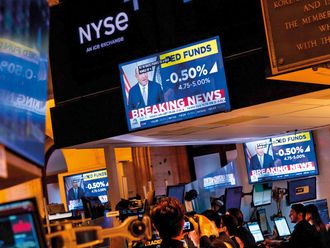
As if the global capital markets hadn't suffered enough shocks lately, life just threw America's hedge-fund masters a beanball. It appears the government wants to toss many of them in jail.
Last week the FBI executed search warrants at three large hedge funds' offices as part of a widening insider-trading investigation. Several other funds, including SAC Capital Advisors, got subpoenas for documents.
This raises an even more intriguing existential question. Is it possible for a hedge fund to profit off its own imminent collapse? A little role-playing exercise shows it's not only possible — it's preordained.
Imagine you are a skilled trader at a hedge fund with a few billion dollars under management. You learn that FBI agents have just arrived to raid your firm.
Knowledge benefits
Lesser beings might cower under the pressure. You, though, realise that you now possess the ultimate edge: The knowledge of what is happening to you at this very moment. You scan the latest news for headlines about your firm and, seeing none, set about on an action plan.
Soon the unsuspecting public will be told that financial stocks are plunging on the news that your firm is being raided.
You have the benefit of knowing this in advance. The only remaining questions: Do you short Goldman Sachs?
Do you short other large banks, too? More importantly, do you short them for your personal account, or for your fund's? Sensing nothing but upside in the downside, you settle on all of the above.
Newest footprints
Next comes the due diligence. Brilliantly, you recall a speech in March by Robert Khuzami, the head of the Securities and Exchange Commission's enforcement division.
"The masterminds leave the fewest footprints, and they are often planning their defence at the same time they are committing the fraud," he said.
"To take a simple example, those who trade on insider information may well accumulate at the same time a stack of research reports on a company whose stock they just illegally purchased, and point to that file when law enforcement comes knocking."
As you consider whether to send Khuzami a thank-you note, you hit the print button. Piles of bearish research reports churn out, ready to be placed on your desk as if they had been there for weeks.
You're probably just being paranoid, though. For all you know, the trades you executed were legal.












